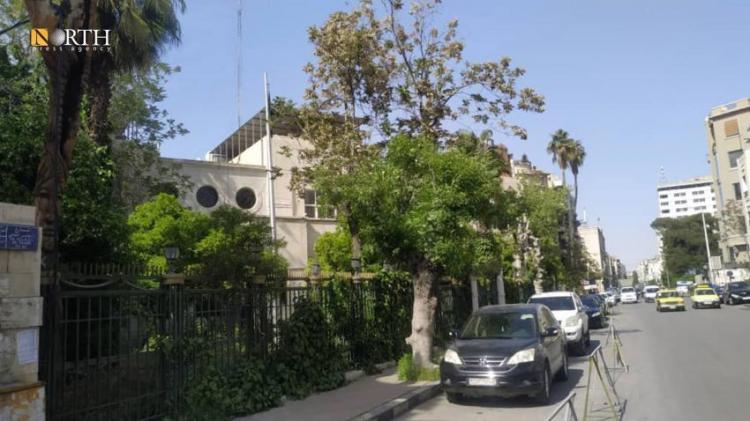Damascus – North-Press Agency
The pharmaceutical sector in Syria has witnessed a significant decline in recent years, which has exacerbated the suffering of Syrians and left them insecure in a vital aspect. This was previously covered by dozens of varieties of locally produced drugs at prices and quality that made them competitive with their foreign counterparts before the start of the crisis in the country.
However, local markets are now suffering from a state of instability in the availability of the Syrian pharmaceuticals and their loss in pharmacies most of the time, where Syrian companies had been providing the Syrian markets need of many items of medicines for various diseases and at low prices.
Tony Dona, a pharmacist in al-Qsour neighborhood in Damascus, told North-Press that “some demanded medicine delivered to us from pharmaceutical manufacturing companies in small quantities despite the fact that there is a big order of it.”
He added that many Syrians who reside outside the country are forced to buy large quantities of Syrian medicine to take with them to countries such as the UAE and Iraq because of the high prices there. Also, taxi drivers on the Beirut-Damascus line take large quantities of medicine with them to the Syrians residing in Lebanon due to the low prices in comparison with Lebanon. This matter lead to their unavailability in the local market.
Pharmaceutical industry companies can be seen in governorates such as Aleppo, Damascus, Homs, Lattakia, and Tartous, in addition to the "THAMECO" company affiliated with the Ministry of Industry, and "PHARMA" company affiliated with the High Board of the Scientific Research in Damascus.
Causes of decline
Pharmaceutical manufacturing expert Muhammad Amer al-Mardini told North-Press that since the beginning of the Syrian crisis, the number of Syrian pharmaceutical factories has declined from 63 to 42, many of which stopped production due to the severe loss at the beginning of the crisis. They have now returned to work, increasing to 92, but the prices of nutritional supplements in them are the most expensive.
Al-Mardini, a professor at the Faculty of Pharmacy at the University of Damascus, lists the difficulties facing the Syrian pharmaceutical sector in the presence of economic sanctions that have affected raw materials and requirements for drug production, despite European countries claiming that their sanctions did not affect the pharmaceutical sector. This is in addition to the sanctions on banking transactions that included the Central Bank of Syria, which have also significantly affected production.
The expert adds to the aforementioned reasons the failure to transport goods to and from Syria as a result of the embargo, as well as an imbalance of energy resources, brain drain, and a huge shortage of expert labor.
Al-Mardini believes that the embargo caused the price of supplies to rise, as the cost of an empty bottle became greater than the price of the drug itself. There is a traditional pricing policy by the Ministry of Health in exchange for a large increase in the prices of imported raw materials, which led to unevenness in the profits of pharmaceuticals. One item profits while the other loses, and this leads to the loss of some items.
The most important items lost
Reem Abboud, a laboratorian at a pharmaceutical company, confirmed to North-Press that some companies stopped producing medicine for neuropathy and other diseases for their health importance, replacing them with nutritional supplements, because their prices are more expensive, in order to compensate for losses.
Abboud explains that companies circumvent the Ministry of Health’s decisions that do not allow the price of the drug to be raised and to avoid loss. It is not permissible to convert a therapeutic medicinal product into a nutritional supplement according to the Ministry’s instructions, which provides the possibility of compensating the company's loss by exporting it abroad.
Medicines with less effectiveness
The expert added that the price of raw materials increased significantly, as did the prices of supplies other than transportation costs, which causes companies to lose. This drives them to produce less effective items in order to compensate for their loss, "and here a solution to this problem must be found."
Um Amir, a mother from Damascus whose child has cerebral palsy, told North-Press that she has had to buy good-quality foreign neurological drugs at very high prices because of the loss of the most important Syrian neurological medicines in the market. After the local product became ineffective, her son often has seizures due to a delay in securing the medication.
The owner of a pharmaceutical company who preferred not to be named described to North Press the current policy pursued by the Ministry of Health in dealing with pharmaceutical companies as "destructive.” They still fix their prices on the exchange rate of the dollar in the Central Bank of Syria.
He added that the banks are no longer able to finance companies' purchases from abroad due to the low dollar exchange rate in the Central Bank. Therefore, the most important drugs, especially cardiovascular and neurological medicines, are not available and the reason behind this is companies’ attempts to offset their losses.
The source expressed his disappointment that smuggling has become an alternative to compensates for the need of the local market, as it is clear that the prices of the smuggled drugs exceed local prices by several times. Despite this, the governmental Health Ministry does not respond to the complaints of the companies, "rather, it allows some pharmaceutical companies to import supplements, vitamins, and cosmetics in hard currency."
Fouad Shaheen, a resident of Jdeidah town in the countryside of Damascus, talked to North-Press about what he suffers during his periodic search for a blood pressure medication produced by a local company, because it is more effective, he does not want to buy it from another company, and it is not available in the same caliber in other companies.

